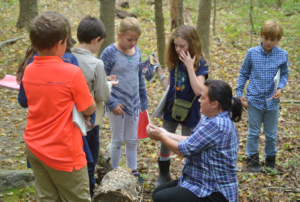Molly O’Leary
WCSU graduate program in Biology alumna Molly O’Leary ‘14 believes that the university’s new Master of Science degree in Integrative Biological Diversity is important for developing a sustainable planet. Teaching at the Wooster School in Danbury since graduating, O’Leary observes that her young students suffer from “Nature Deficit Disorder,” a term describing the costs of living technology-based and screen-immersed lives, including attention difficulties, obesity, and higher illness rates, as well as alienation from nature andlack of interest in sustainability. Once a week, O’Leary takes her classes out into the woods to explore and discover, providing an experience of unbounded curiosity and playful discovery. “My goal is to make it possible for my students to experience the natural world in as much abundance as I have,” she explained. “They can form intellectual and emotional connections which may later influence them toward research and stewardship.”

Regarding WCSU’S revived Master of Science degree in Integrative Biological Diversity, O’Leary is excited about the required stewardship project that students must complete towards graduation. “I believe those who are ‘naturalists’ have a job in society that is critical to all life,” she said. O’Leary aims to give her students a strong start in curiosity about, and interest in, the natural world that will serve them well as they grow into adults who care for our planet and its resources—and possibly work in the biological sciences.
O’Leary received a bachelor’s degree in sociology from the University of Colorado, where, as an undergraduate working in the University of Colorado library, she became fascinated with Alaska topographic maps. After graduation, this interest led O’Leary and her partner to “drive to the end of the road in Homer, Alaska.” That road trip started several years’ labor in the Alaska fisheries industry in the coastal towns of Homer, Moose Pass, and Seward. “On the docks and the boats,” O’Leary said, “I met many people who respect and depend on these fish and work to ensure the species’ conservation.”
O’Leary then worked in social services, eventually moving to Dutchess County, NY, where she also worked as a farm caretaker and manager of an alpaca farm. “I began to burn out after working in human services and started taking a general bio course at WCSU with Dr. Bronstein,” O’Leary recalled. “Although the course load was tough with a full-time job, two young children, and the farm, it was exactly what I wanted.”
Under the guidance of Professor of Biological and Environmental Sciences Dr. Mitch Wagener, Professor of Biological and Environmental Sciences Dr. Theodora Pinou, and Professor Dr. C. Thomas Philbrick, O’Leary conducted research sponsored by the Connecticut Department of Transportation to quantify and characterize changes in habitat quality of endangered Northern Slimy Salamanders along the U.S. Route 7 bypass in Brookfield. “Without Dora, I would not have gotten my project opportunity,” O’Leary said. “Without Mitch, I would not have known what to do, and Dr. Philbrick taught me how to write.”
The Northern Slimy Salamander gets its name from a sticky secretion the animal exudes as a defense against predators. The subspecies is at its northernmost range in Connecticut, with only a few populations in western Fairfield and Litchfield Counties and is listed as a threatened species in Connecticut. O’Leary’s project examined changes to soil invertebrates—worms—resulting from the widening of Route 7. “Changes in the soil meant that the invertebrate population, an important food source for the salamander, moved and declined. The stress of moving into new territory could further endanger the salamander,” O’Leary explained.
Today, O’Leary teaches her own students to study the small, vital lives under their feet and to learn the web of connections on which life depends. “It’s active fun and it gives them a different perspective—a healthier way of interacting with the world, and in turn they learn ways to keep the world healthy.”
O’Leary emphasized the benefits of attending WCSU’s program, especially for adults who must work for a living and to support families. “It was perfect for me. I was supported and given research opportunities, work study, and financial help from stipends. WCSU offers plenty of opportunities for field research. It’s hard, and you have to put yourself out there to get it. But if you are self-motivated, have a strong work ethic, and are passionate about your interest, you’ll get an excellent education and experience at WCSU.”